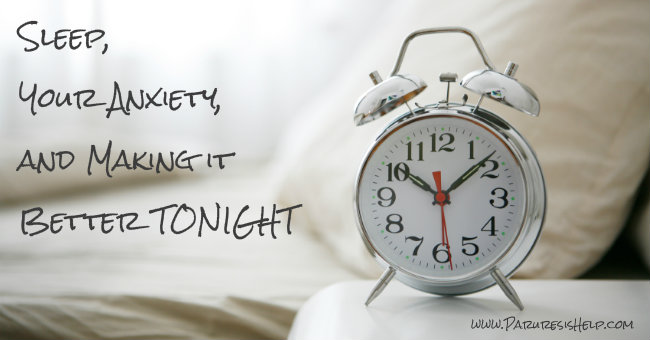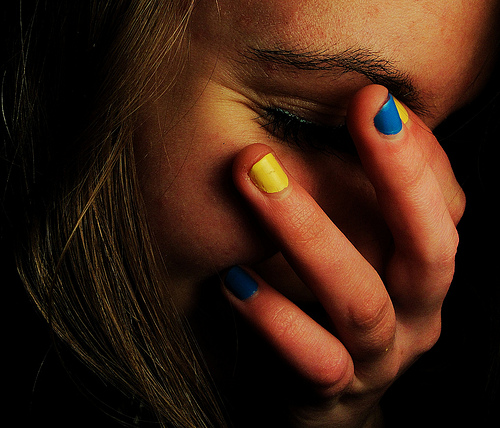
All people, especially those who suffer from anxiety, need regular amounts of quality sleep in order to function normally. Lack of sleep can produce irritability, increase anxiety, result in poor work performance and lead to depression. Seven to eight hours of good sleep is ideal for adults, according to MayoCinic.com, yet good sleep is not always easy to come by. Minds can wander, anxiety can strike, and a single sleepless night can develop onto full-blown insomnia. Lack of sleep may lead to high blood pressure and a weakened immune system, making it harder to fend off or recover from colds and other illnesses. Long-term sleep deprivation increases the risk of obesity, cardiovascular disease and diabetes.
So how can you get a good night’s sleep? Establishing routines and developing other good habits can help.
Bedtime Routine
Establishing and maintaining a bedtime routine is one of the most important things you can do, especially if you suffer from anxiety. According to the Anxiety Disorders Association of America, sleep deprivation can exacerbate anxiety symptoms, but sleep disorders may also actually be the cause of anxiety. The Mayo Clinic website suggests going to bed and getting up at the same time every day, even on holidays, days off and weekends. Your body becomes used to the sleep cycle when it’s reinforced, resulting in a more peaceful slumber. Of course, there will always be days when your routine is thrown off or your mind just won’t stop reeling. Agonizing about not being able to fall asleep can make the situation worse. If you don’t fall asleep within 15 minutes of lying down, get up, do something relaxing, and try again once your brain has unwound.
These bedtime rituals can also help you go to sleep more easily:
- Turn off all electronic devices one hour before bedtime. Over stimulation from computers, phones and even television can inhibit sleep.
- Take a warm bath at night before bed. Once the electronic devices are off, you may enjoy relaxing in the tub for 15 minutes or so.
- Get into comfy pajamas after the bath and then brush your teeth, comb your hair and use the restroom. Perform all your nightly rituals that need to get done with regularity as part of the routine.
- Read to book, listen to soothing music, or do both. Both activities help the brain unwind and distress. Keep your reading time to around 15 minutes.
- Dim the lights if possible. This can further signal to your body that it’s time to slow down and help prompt drowsiness.
After a few nights of your new routine, you are likely to begin to fall asleep more easily and quickly.
Exercise and Activity
Physical activity is important for your overall health and wellbeing, but it is also a very important part of getting quality sleep. A person who is sedentary most of the day will not fall asleep as easily as one who is physically active. Planning times for exercise and other physical activity will not only relieve your anxiety help you relax, it will also make you ready for sleep when the time comes. Just make sure any activity ends well before your bedtime routine so your body is not pumped with energy. Consider these activities for some great after-work exercise:
- Take a fitness class. Make sure that it focuses on an activity you enjoy, is something you are interested in and that it does not add more anxiety by being too time consuming.
- Go for an evening walk or bike ride.
- Invite friends or neighbors to walk with you.
- Go to the park and enjoy carousing with nature.
The goal of physical activity if you’re suffering from anxiety is to improve your overall health and help you to sleep better. Adding too many activities may increase your anxiety due to increased pressure to perform at work and during your leisure time. Make sure all activity is done at least two hours before your bedtime routine so you have plenty of time to relax.
Guided Meditation and Visualization
A great way to promote relaxation and help prepare for sleep is through guided meditation and visualization. Guided meditation and visualization uses mental images from nature to help a person calm down and relax. Guided visualization also uses music to sooth the senses and promote feelings of peacefulness. Practicing guided meditation and visualization will help you learn to channel anxiety in positive ways. Doing some guided meditation and visualization as part of your bedtime routine promotes relaxation, calms the senses, promotes quality sleep and reduces nighttime wakefulness.
Promoting Sleep with Dietary Changes
Certain foods can inhibit sleep while others can promote it. Understanding the relationship between sleep problems and food can help you make better pre-bedtime choices. People who suffer from anxiety may have heightened sensitivity to certain foods which makes planning meals throughout the day even more important. The National Sleep Foundation calls making food choices to promote better sleep a part of an individual’s sleep hygiene. Like other areas of personal hygiene, good sleep hygiene can improve one’s ability to fall asleep and stay asleep throughout the night. The National Sleep Foundation offers the following dietary recommendations:
- Do not eat right before bed. Large meals can be especially problematic as feeling full can be uncomfortable.
- Limit caffeine in beverages as well as food. If you are having trouble sleeping, eliminating all caffeine is a good idea.
- Limit sugary snacks and beverages throughout the day but especially at bedtime. Too much sugar can cause excess energy.
To help promote sleep try a cup of warm milk with a sprinkle of nutmeg before bed. Nutmeg contains a compound called myristicin that encourages the production of serotonin in the brain and helps with relaxation.
Electronics and Sleep
With so much technology available, we often spend more hours than we realize with electronics. People with anxiety and sleep issues need less time interacting with electronic devices and more time in true relaxation prior to going to bed. Some experts go as far as to recommend an “electronic curfew” one hour prior to your bedtime. That means no email, late-night television viewing or Internet surfing.
Many recent studies, including those at Osaka University in Japan and the Lighting Research Center at Rensselaer Polytechnic Institute in New York, show that video games and other electronics cause the sleep hormone melatonin to drop and can produce the “fight or flight” syndrome. This puts the mind and body in a state of stress and can elevate both blood pressure and pulse. Along with this, Dr. Victoria L. Dunckley, M.D. says in Psychology Today that there are two other ways electronics affect your ability to sleep:
- Unnatural brightness of the screen. Melatonin is released by darkness and inhibited by light. When the eyes experience intense brightness, they channel that bright light directly to the brain, shutting down the sleep switch. Sleep/wake cycles, or circadian rhythms, are also disrupted. Studies show that deregulated circadian rhythms causes mood, concentration and hormonal dysfunction
- Electromagnetic radiation (EMR), a by-product of electronics. Monitors, anything wireless, and internet use compound the level of EMR, making handheld video games particularly toxic. Like bright light, EMR disrupts melatonin release. (It also exacerbates the fight-or-flight state)
Engaging in the “sleep curfew” by shutting off all electronics at least one hour before bedtime will help encourage your natural sleep-inducing mechanisms to work properly. Consider limiting use of electronics throughout the day as well to decrease stress if you suffer from anxiety.
Sleep and Environment
Along with establishing a bedtime routine, creating an environment that is conducive to sleep is also important. People suffering from anxiety need organized spaces without being over-stimulated. Too many wall hangings or other decorations can become a distraction. Bright colors can cause excitement rather than relaxation. Too many gadgets at an arm’s reach from the bed may create too much temptation to fiddle with them while trying to go to sleep. Use these tips to create an environment that is calming to help you go to sleep and stay asleep:
- Choose room colors that are soothing like greens and blues.
- Wash and dry bed linens and blankets in lavender-scented laundry detergent or dryer sheets. Lavender increases relaxation.
- Keep clutter to a minimum, and make sure clothing and gadgets are put away before bedtime.
- Use white noise like a fan or white noise machine to block out noise from other parts of the house.
Doing these few simple things can help create a soothing environment and encourage better-quality sleep.
A Time to Relax
Getting more sleep may mean you need to go to bed earlier. It is also important to look at your schedule and find ways to make more time for sleep by eliminating some activities. Busy schedules can make getting to bed on time almost impossible. Making bedtime enjoyable for yourself is the best way to encourage quality sleep. A relaxing bath, a good book, gentle music or any other soothing activity you enjoy can help. Talking to other people about what they do at bedtime is also a great way to get new ideas. Getting advice from people who are trying to accomplish the same goal helps you know you are not alone.
People who suffer from anxiety may struggle more with falling asleep and staying asleep than other people and talking to your doctor or therapist is a great place to begin looking for answers. Your doctor can look for and diagnose any medical condition that may be contributing to your sleep issue. Therapists can help you understand why falling asleep is an issue and give you tools to use that may help. Everyone can benefit from getting enough quality sleep. Living a balanced life of work, play and rest promotes better health and an overall sense of well-being. We all need quality sleep to refresh our minds and repair our bodies. Engaging in good sleep behaviors will benefit everyone around you and create a more peaceful and relaxed state of mind for everything you do.
SOURCES:




